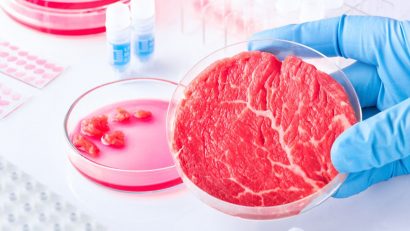Genetically Modified Organisms are obtained through the manipulation of their genome by adding or removing DNA in genes coding certain traits, that are necessary, in order to yield some desired characteristic(s) in the offsprings.
A gene is the basic unit of heredity.
Genes are made up of DNA (deoxyribonucleic acid) and they synthesise amino acids that form proteins.
Each gene occupies a specific position (in the chromosome in the nucleus of a cell) and a genome refers to the complete genetic make-up of an organism.
Scientists start by mapping the genome, knowing which genes are responsible for what, as well as their position.
They then add, or remove, some to genetically modify the organism to obtain the desired characteristics in the offsprings.
This is a quicker (and more efficient) method than traditionally breeding the plant or animal.
The desired heritability, or the required level of inheritance, is achieved as needed and faster too.
Traditionally, plants are cross-pollinated and animals cross-bred to upgrade a variety and get a hybrid.
The problem is that the breeder will have to test-cross and wait for the offspring to see the level that the desired traits are inherited.
The breeder may need to back-cross and repeat the process over and over again to obtain the desired level of heritability.
This takes time, and the farmer must still go back to the breeder to get the hybrid seeds, or animals like day-old chicks bred from the grand parent stock.
In GMO, the genes from a good variety or breed are mapped and used, as required, to upgrade another variety or breed of that organism and get a desired product.
It can also be transgenic, whereby genes from a plant, say paw paw, can be introduced into another plant, say mango, to genetically engineer a much bigger mango fruit.
Such traits, like for sweetness etc, can be further introduced that way into the plant to yield a big and sweeter fruit.
Foods have been genetically modified to increase yield, nutrition, taste, early maturity, longer shelf life as well as for disease, drought, and insect resistance.
In few countries, GM male mosquitoes are used to successfully control malaria and other mosquito-borne diseases.
Female mosquitoes suck blood, but male mosquitoes feed on fruit juices. The male mosquitoes are genetically modified to have a deleterious gene that kills only their female offsprings.
Such GM male mosquitoes are released into the wild to mate and produce offsprings of which the female die, and the male offsprings continue the cycle with the deleterious gene they inherited.
This technology has been used in Florida, Brazil and is being used now in Djibouti.
A lay person may wonder: is it safe to the public and are the rights of people and environmental protection guaranteed?
Yes, this technology is not allowed to be used without regulation.
What happens in the case of genetic modification for insect resistance, for instance, is that DNA from a variety that has genes for insect resistance is used to confer insect resistance on a variety that does not.
Pesticides are not added to the genes to confer this resistance.
Traditionally, resistance to cowpea weevil insects and other desirable traits have been achieved in Nigeria through breeding. Cowpea is now more nutritious and cooks much quicker too.
Farmers go back every planting season for the hybrid seeds, instead of planting the old, undeveloped varieties and use harmful insecticides to treat their produce.
This took a long time. Now, it is easier and quicker to use the genes that confer weevil resistance to have a genetically modified cowpea, but the farmer still has to go back for the seeds, as in the bred version, for planting.
There can be synergistic effects. The effect of genetic modification is not always additive.
Tests are run to ensure safety and that allergens are not transferred as some people are allergic to certain foods and products.
In addition, information on the constituents of GM foods are, by law, displayed on the labeling.
This protects the rights of persons who, for say religious reasons, avoid certain foods. Moslems, for instance, do not eat pork, and need to be informed if a swine gene is in the product they are buying. Vegans, who avoid animal products, also have the right to know that their products are completely plant-based.
However, persons opposed to GMO and this technology argue that these are not enough.
GMO is anti-nature, they say. Plants and animals should be allowed to breed naturally.
There is no doubt that science without humanity is a social sin, but it must not be natural to be ethical.
Is flying in airplanes natural? If nature wanted men to fly, they would have evolved wings.
Is it natural to use the telephone and internet, read newspapers, listen to the radio, or watch television sets as channels of communication?
Why travel to the Moon, or develop the technology to deflect a heavenly body, like an asteroid as the one that wiped out the dinosaurs, from hitting and shattering the Earth?
Is it natural to receive an artificial heart, or do organ transplant, or perform a Caesarian operation to save a mother and baby, or cure sickle cell disease by gene editing?
Others say GMO is a relatively new technology, and the health implications are not fully understood. Some say it may even lead to cancer and hypertension.
For similar reasons, there are people who still prefer much more expensive organic foods and shun farm produce grown with inorganic fertilisers.
Farmers in Nigeria knew that inorganic fertilisers increase crop yields since 1962.
There has been no health risks with proper use of inorganic fertilisers since then, but the discrimination continues.
Nutrition is sometimes an art, not a science. How can it be explained that some people prefer white-shelled eggs to brown-shelled eggs, or vice versa, despite the insistence of the nutritionist that both are nutritionally equivalent.
Eating cow hides, locally called ponmo or canda, which has no nutritional value, is still a big delicacy in Nigerian villages.
The leather industry has consistently cried out that the practice is depriving them of hides, which are important raw materials for them.
There is a Gamma Irradiation Facility in Sheda Science and Technology Complex in Sheda, near Abuja that, among other things, uses Cobalt-60 isotope to produce ionising radiation to irradiate foods like cowpea to disinfest them.
The radiation is used by experts to kill the insects, their eggs, and mould in the food. It passes through the food and does not reside in it, and yet some people still raise health concerns in using it despite the fact that the technology has been in use in most countries of the world for decades.
The disease polio was eradicated in the world in 1999.
In July, 2003, a propaganda arose in Nigeria that the vaccine is tainted with anti-fertility agents to de-populate Nigeria being the most populous black country in the world.
Polio returned in Nigeria.
The government set up a committee of traditional and religious leaders, with experts, who visited the vaccine production process before convincing people that the vaccines are safe, and are same as the other vaccines used all over the world for decades.
A massive free polio immunisation campaign of 270 million vaccines yearly was launched in the country, until Nigeria was declared polio-free again in 2016
The first GM food in US is a tomato in 1994.
According to the US Food and Drug Administration, FDA, by 2020, 94% of soya beans planted in US were GM, cotton: 96% and corn: 92%.
By 2023, US had the largest land area in the world under cultvation for GM crops at 74.4 million hectares. Brazil was second: 66.5 million hectares.
There has not been a health incident associated with GM foods.
GM products are used in US and other developed countries, and the insinuation, sometimes, that they are dumped on Africa is unsubstantiated.
Another point raised by opponents of GMO is with Genetic Use Restriction Technology, GURT, sometimes called the terminator seeds or suicide seeds.
In this technology, the GM plants are engineered to produce sterile seeds. This forces the farmer to go back to the multinational corporation, like Monsanto, each time to buy seeds for planting. That creates dependency to the disadvantage of small-scale farmers.
The good news is that few GM seeds are engineered this way, and they are optional, that is, one can choose not to buy them.
GURT seeds help safeguard the environment from genetic pollution, and big farmers like them.
Commercial farmers do not need to re-plant them, as they do with hybrid seeds because if re-planted, they yield much less than the original. Commercial farmers, therefore, like going back to the breeder for new seeds for each planting season.
However, Brazil and India, with many small-scale farmers, have banned GURT seeds, and use only non-GURT seeds. Nigeria also, does not use GURT, so that their subsistence farmers can re-plant the seeds, if they wish to.
This is why the biotechnology promoter in Nigeria, National Biotechnology Development Agency, NABDA, and the regulator, National Biosafety Management Agency, NBMA, say critics of this technology are over-reacting.
Nigeria also has a food and drug regulator, National Agency for Food, Drug Administration and Control, NAFDAC. These agencies of government all work to protect life and the environment.
Every country has a seed bank and indigenous varieties that may have some special genetic traits are preserved.
The risk of losing poor-yielding varieties with special genetic traits, over time, applies also to hybrid seeds bred traditionally.
Do we stop using hybrid seeds too?
Anti-GM campaigners in Nigeria sued NBMA in 2016 over an approval for GM cotton. The case dragged in court until Justice D. U. Okoro of the Federal High Court, Abuja, dismissed it in its entirety for lacking merit on July 22, 2022.
Nigeria approved the sale and public use of the TELA variety of genetically modified maize in 2024.
The approval, on behalf of the Federal Government, was by the National Committee on Naming, Registration and Release of Crop Varieties, Livestock Breeds/Fisheries, NCNRRCVLF, in its 37th meeting at the National Centre for Genetic Resources and Biotechnology, NACGRAB, in Ibadan, on January 11, 2024.
The four varieties: SAMMAZ 72T, SAMMAZ 73T, SAMMAZ 74T and SAMMAZ 75T, are resistant to stem borers and fall army worms and also mildly tolerant to drought. None is a GURT seed.
Stem borers, Buseola fusca, are particularly a problem in Nigeria. They bore into stems of maize crops and feed on the crop from the inside. A local way of controlling them is to cut and collect the stems and burn them to kill the insects, but many escape and continue the spread in nearby farms. The other way of control is the heavy use of insecticides to get the insects hiding inside the plants.
The TELA varieties can also increase yields by up to 10 tonnes per hectare.
The environmental release approval was earlier granted by the National Biosafety Management Agency, NBMA, in October, 2021.
The TELA Maize Project is also currently implemented in Ethiopia, Kenya, Mozambique and South Africa.
However, in Nigeria, public rejection arose in June, 2024, that the seeds are dangerous and can cause cancer. Some called it “Bill Gates-Funded Artificial Maize.”
Bill Gates, the American billionaire philanthropist, launched Alliance for a Green Revolution in Africa, AGRA, in 2006 to assist 30 million small farmers in African countries – Ghana, Nigeria, Niger, Mali, Burkina Faso, Ethiopia, Rwanda, Uganda, Kenya, Tanzania, Malawi, Mozambique and Zambia – with 600 million dollars.
AGRA funds and encourages the use of modern farming technologies, including locally developed ones, to increase productivity and boost the income of local farmers.
There are reports in the social media that such technologies are designed to introduce Western style of agriculture and even de-populate Africa, if adopted.
Same propaganda when the disease HIV/AIDS was first discovered in Africa in the 1980s: some Western countries must have planted it to punish the people of colour.
When Covid-19 disease was first discovered in China, Asians never claimed it targeted Chinese and Indians who are even more populous than Africa and are emerging as world leaders in technology.
If America did not wish Africa well decades ago, was President Barack Obama also privy to a US plot to annihilate people of African descent?
Sentiment against GM foods is not only in Africa. A poll in US shows that 39% of Americans feel that non-GM food is safer than GM foods.
History does not support the conspiracy theorists as life expectancy in the world is increasing over the years. History shows that life expectancy in Africa now is about 60 years, from less than 30 years one century ago.
One century ago, Africans were only eating organic foods, with animals on free range, and there was no GMO.
While more public engagement is needed, opposition to GM technology must not be taken too far, deep into the domain of sentiments, without backing by science and facts.
It is hoped that developing countries, like Ngeria, should wake up and remain guided by scientific knowledge, and not let the advantages of this technology pass her by, untapped.
Agricultural land is a, more or less, fixed resource and food security has great political implications as citizens complain over high cost of living, especially over high food prices.
The government has a duty to approve a technology that can produce more and better food and raw materials, without putting more land into cultivation, provided it is safe.
Scientists are doing what they are supposed to do with this GMO technology.
Faulting them, the government and farmers adopting this technology, based on sentiments without evidence or sufficient proof is, to say the least, uncharitable.











